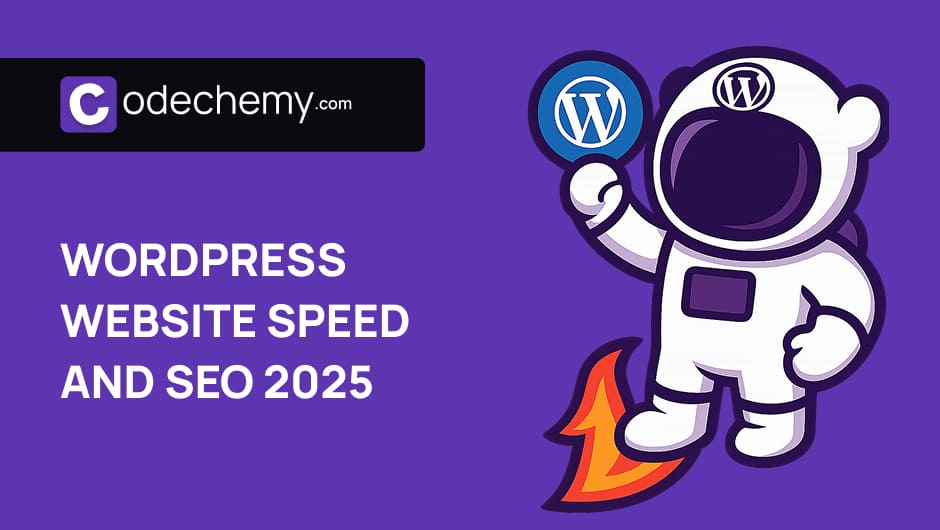In 2025, having a beautiful WordPress site is no longer enough — if it’s slow, it’s invisible. WordPress website speed and SEO are now tightly connected. Google prioritizes fast websites. Users abandon slow pages. And businesses that neglect performance are leaving money on the table.
This article breaks down the hard truth about slow websites — and how speed directly impacts your visibility, reputation, and revenue.
Why Website Speed Is a Business Metric (Not Just a Technical One)
Website speed used to be a developer’s problem. Today, it’s a boardroom issue. Here’s why:
| Business Impact | What Happens When Your Site is Slow |
|---|---|
| 🔎 Lower Google Rankings | Google Core Web Vitals penalize poor performance |
| 😡 Higher Bounce Rates | 1 in 2 users leave if a page loads in over 3 seconds |
| 💸 Lost Revenue | 0.1s delay = 7% drop in conversions (Google study) |
| 📉 Lower ROI | Ads + SEO bring traffic — but speed kills conversion |
| 😠 Brand Perception | Slow = outdated, unprofessional, untrustworthy |
🧩 In other words: a slow site damages your growth, trust, and bottom line.
The Data: How Site Speed Affects SEO and Conversions
🔍 1. Google’s Core Web Vitals
Since 2021, Google includes speed in its ranking algorithm via Core Web Vitals:
-
Largest Contentful Paint (LCP) — should be < 2.5s
-
First Input Delay (FID) — should be < 100ms
-
Cumulative Layout Shift (CLS) — should be < 0.1
If your WordPress site scores poorly, you’re already losing organic traffic.
2. Real-World Conversion Stats
| Page Load Time | Bounce Rate | Conversion Rate Impact |
|---|---|---|
| Under 1 second | ~7% | High |
| 1–3 seconds | ~15% | Standard |
| 3–5 seconds | ~32% | Up to -20% |
| Over 5 seconds | ~90% | -40% or more |
Source: Google/SOASTA, Portent, Deloitte Digital (2023–2024)
🎯 Speed = money. Every second counts.
WordPress Performance Pitfalls (And Why They Matter)
WordPress is powerful — but it’s easy to bloat. Here’s what kills performance:
| Common Bottleneck | SEO/UX Consequences |
|---|---|
| Bloated themes | Longer render time, lower LCP |
| Unoptimized images | Huge file sizes, slower first paint |
| Too many plugins | Increased DOM size and JS execution |
| Cheap shared hosting | Time to First Byte (TTFB) delay |
| No caching or minification | Bigger page size and uncompressed assets |
How to Improve WordPress Website Speed (And Boost SEO)
1. Use a Performance-First Hosting Provider
Avoid cheap shared hosts. Use Cloudways, Kinsta, or WP Engine for business-grade performance.
2. Choose a Lightweight Theme
Hello Elementor, Astra, and GeneratePress are top picks for speed.
3. Use Page Builders Wisely
Elementor is powerful — but must be optimized. Avoid excessive widgets, use global styles, and disable unused features.
4. Optimize Images Automatically
Use WebP format, compression plugins (Imagify, ShortPixel), and lazy loading.
5. Caching & CDN
Use WP Rocket + Cloudflare. Combine with GZIP and browser caching for major gains.
6. Minify CSS/JS + Delay Non-Critical Scripts
Use built-in tools or optimization plugins to eliminate render-blocking resources.
7. Measure & Monitor
Use:
-
Google PageSpeed Insights
-
GTmetrix
-
WebPageTest
-
Lighthouse Reports
📌 Benchmark weekly — SEO results are tied to consistency.
What Business Owners Need to Understand (In Plain English)
-
If your site is slow, Google will push your competitors higher.
-
If your site is fast, visitors stay longer, trust you more, and buy.
-
Speed isn’t just technical — it’s directly tied to business outcomes.
-
A slow website wastes your marketing budget (PPC, SEO, social).
Real Business Example: What Speed Optimization Can Do
Client: Mid-size B2B service provider
Problem: Site load time = 5.6 seconds
Fix:
-
Switched to fast hosting
-
Removed bloated plugins
-
Implemented caching, image optimization, critical CSS
Result: -
Load time cut to 1.3s
-
Bounce rate dropped 28%
-
SEO traffic up 34%
-
+$22K in revenue from organic traffic in 3 months
Why You Should Invest in WordPress Speed Optimization Service
| Investment | ROI |
|---|---|
| $300–$800 one-time service | + Better SEO rankings |
| Faster page load | + More leads, lower ad costs |
| Core Web Vitals compliance | + Avoid algorithmic penalties |
| Improved UX | + Better brand reputation + trust |
🤝 Smart decision-makers treat speed like an asset — not a technical detail.
Final Thoughts: Speed is the Silent Salesperson
A fast website:
-
Ranks higher
-
Converts better
-
Builds trust
-
Saves money on ads
-
Leaves a lasting impression
If you’re serious about growth — you can’t afford to have a slow WordPress site in 2025.
🟣 Ready to Optimize Your WordPress Website?
At Codechemy, we help businesses improve performance and pass Google’s Core Web Vitals using cutting-edge WordPress optimization strategies.
